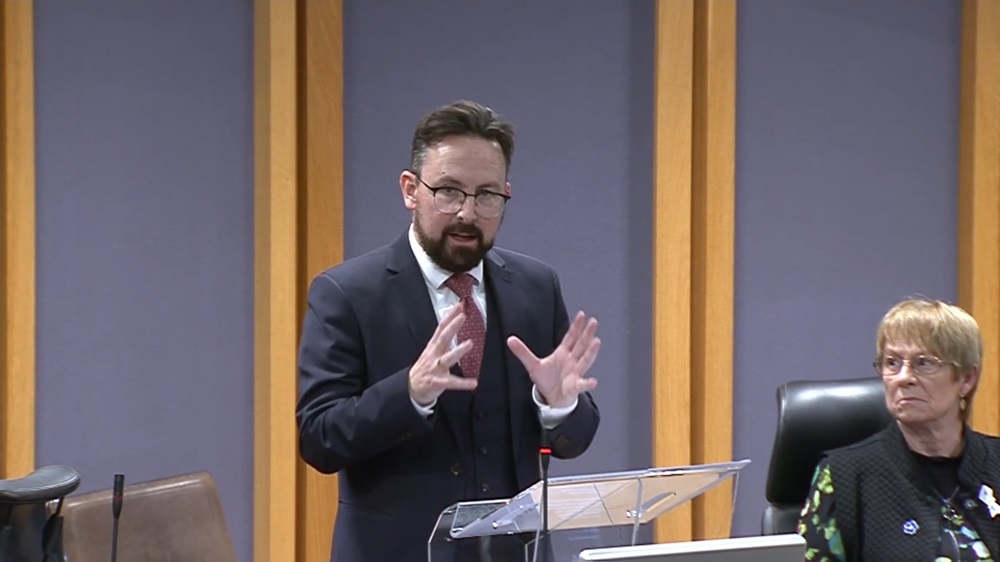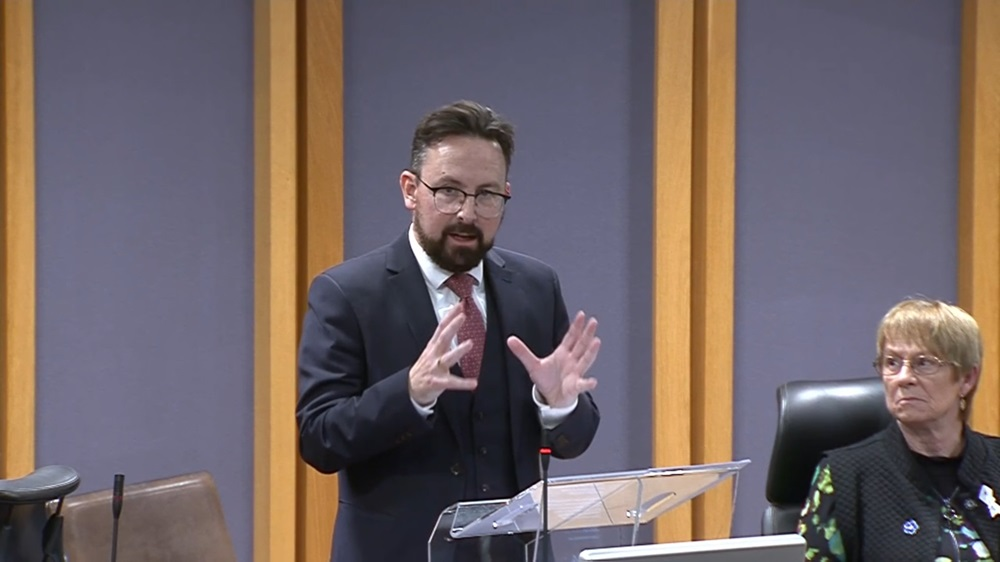 Hefin David MS
Hefin David MS
Chris Haines, ICNN Senedd reporter
MSs have supported calls to end the human rights scandal of autistic people and those with a learning disability being inappropriately detained in hospitals.
Hefin David tabled a cross-party motion on the Stolen Lives campaign led by families whose loved ones have been trapped in hospitals due to a lack of community support.
The Caerphilly Senedd member shared the experience of Dawn Cavanagh’s son Jack, who was placed in an unsuitable secure residential unit more than 100 miles away.
Dr David explained that Jack was later sent to live in a psychiatric intensive care unit in Wales despite not having a mental health condition.
He said: “Imagine you, as the mother or father of that young man, seeing him experience what is effectively a prison experience simply because he’s autistic.
“Jack lived there for over two years.”
Harrowing
Dr David, whose daughter is autistic, told the Senedd that Jack is now thriving in a more appropriate environment after his parents overturned the decision to section him.
He said: “Here are some of the things he said to his mother following this change in his life: ‘I can see the moon and the stars’, ‘I have grass’, ‘I can hear birds’, ‘Thank you for my new home’, ‘Mummy, I’m a free man.’ But there are still many others who exist in this condition.”
Leading a debate on December 4, he warned: “This, at its heart, is a human rights issue.
“We cannot risk Wales being in continual breach of the Human Rights Act 1998: the right to be safe from harm, the right to liberty, and the respect for private and family life. The inappropriate use of deprivation of liberty orders must stop.”
Sioned Williams expressed concerns about the harrowing and completely unacceptable treatment of people inappropriately detained because they are disabled.
Scandal
Ms Williams, who represents South Wales West, raised the grave injustice faced by a family whose son Will was constantly frightened after being sectioned.
She said: “Their son was sectioned, without their foreknowledge, over an Easter holiday when they couldn’t challenge what was happening. And the sectioning was traumatic.
“Will was told he was going on holiday and then admitted to a mental health unit, although it was determined later the issue leading to the section was not related to his mental health.”
Ms Williams warned: “There’s a human rights scandal here because this isn’t an isolated case, and lives like those of Will are being stolen. It’s a fact that the human rights of people with a learning disability and/or autism are being breached.”
Mark Isherwood said Learning Disability Wales states about 150 autistic or learning disabled people are known to be in a hospital setting, with two-thirds for longer than ten years.
Accountability
He told the Senedd: “Wales was one of the first countries in the world to launch a strategy to get people with a learning disability out of long-stay hospitals, back into the community.
“Yet we seem to be going backwards and slipping towards re-institutionalisation.”
Carolyn Thomas raised a 1,754-name petition submitted by Stolen Lives calling for an end to the detention of learning disabled and autistic people in hospitals.
In a letter to the petitions committee chaired by Ms Thomas, the campaigners welcomed positive engagement with the Welsh Government.
But the petitioners wrote: “We need to see an action plan, with specific, measurable, attainable, relevant and time-based goals. We need to be able to hold people to account.”
Ely Hospital
Julie Morgan noted more than 40 years have passed since publication of the all-Wales strategy as she reminded members how far Wales has come.
The strategy followed an inquiry into allegations of ill-treatment of patients and pilfering by staff at Ely Hospital which sparked outrage when revealed by the press in 1967.
Ms Morgan pointed out her colleague Mark Drakeford co-wrote a book on the inquiry, which sought to transform the way people with learning disabilities were treated in the wider NHS.
She said: “I was involved with Ely Hospital … looking back 40 years and listening to this debate, I can still feel the sadness of some of those children who lived in Ely.
“I particularly remember one little boy who had had hydrocephalus … he sat in the window all day, every day, waiting for his mother to come to pick him up, and that went on for years.”
‘Not good enough’
Sarah Murphy, who was appointed mental health minister in July, said: “No-one wants to see a return to the dark days where people with learning disabilities were institutionalised.”
She added: “The latest data that we have shows that, in October, there were 140 adults with a learning disability who were receiving ongoing care in an in-patient setting; 22 were in England. This is not good enough.”
Ms Murphy vowed to work closely with Baroness Merron, her Westminster counterpart, to ensure the UK Government’s mental health bill works for Wales.
She explained: “Importantly, this bill introduces changes so that it will no longer be possible to detain a person with a learning disability or autism for longer than is needed for assessment, unless they have a co-occurring mental health disorder.”
In closing, Ms Murphy told the Senedd: “I agree: this is a human rights issue, so, let me reiterate: one person in a bed and not in a home is one too many.”
For the price of a cup of coffee a month you can help us create an independent, not-for-profit, national news service for the people of Wales, by the people of Wales.





